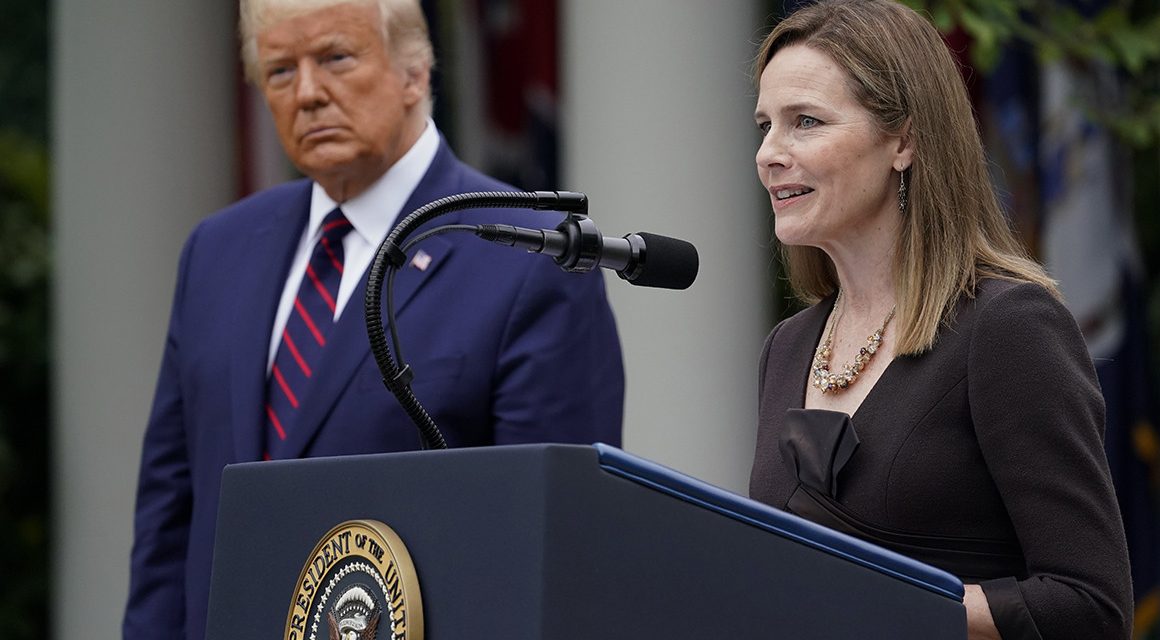There is no realistic scenario–not even the president contracting COVID-19–in which the nomination of Amy Coney Barrett to the Supreme Court will be defeated in the U.S. Senate prior to Election Day. The Republicans currently have the votes to put her on the Court as the replacement for Ruth Bader Ginsburg, and no argument or pressure campaign can dissuade them from exercising their power.
Therefore, it makes no sense for the Democrats to take political risks or throw everything but the kitchen sink at Barrett, as they did, for instance, in the nomination of Brett Kavanaugh, arguably costing Democrats three red state senate seats. They have a better chance of stopping her confirmation if they can push off a vote until after the November 3rd election. They can best achieve that with a strategy of procedural delay and messaging focused on the unprincipled and unprecedented way the GOP is forcing this confirmation in the middle of an election. Indeed, there are scenarios in which the Trump’s illness makes delay the more likely outcome.
Fortunately, Senate Minority Leader Chuck Schumer seems to understand that this confirmation should not be treated as a normal one. On Tuesday, before news broke of the president’s condition, Schumer tweeted that he would not meet with Barrett and lend credence to “such an illegitimate process.”
Four and a half years ago, Senate Majority Leader Mitch McConnell refused to entertain Barack Obama’s nomination of Merrick Garland to the Supreme Court on the grounds that it was an election year. Now he’s looking to push through Donald Trump’s nominee in a severely truncated process in the last days before an election. By his own standard, this is not valid.
There’s another reason this nomination is not legitimate. As our editor-in-chief Paul Glastris stated, “A working majority of GOP senators pledged to support Trump’s nominee before they knew who it was!” That, notes Glastris, is “an admission by these GOP senators that they are not considering the nominee’s qualifications and not open to any arguments based on qualifications.”
Under these circumstances, the most principled position for Democrats to take is to refuse to engage in the normal Kabuki of a SCOTUS nomination process. This principled stand is also the politically wise one. It would be dangerous for Democratic Senators to, say, raise questions about how Coney Barrett’s religious views might influence her jurisprudence, as Senator Dianne Feinstein did at her 2017 confirmation for the appellate court, or to react to last minute unprovable allegations from her past, as Democrats did in the Kavanaugh hearings.
But that doesn’t mean Senate Democrats have to passively accept Coney Barrett’s nomination. Quite the contrary: they can fight it hard, and with better (though still long) odds for success, through a disciplined approach that relies less on white hot rhetoric than on delay. The aim should be to push the confirmation vote past the election when conditions could be much more favorable for killing the nomination. Successful or not, a strategy of aggressive delay can help voters see this confirmation process for what it is: a raw exercise of power that violates wise and well-established norms for filling lifelong appointments and does real harm to the respect Americans have for the Court.
The key facts to grasp in such a delay strategy are not Coney Barrett’s views on Stare Decisis or the dogma of People of Praise, but the quotidian workings of Senate procedure. So, at the risk of boring you with wonkery, here’s what the Senate Democrats can and should do:
If events proceed as planned, on Monday October 12, 2020, Senate Judiciary Committee Chairman Lindsey Graham of South Carolina will hold the first of four hearings to consider Barrett’s nomination. On October 26, just eight days before Election Day, the Republican-controlled committee will report her nomination favorably to the full Senate.
That doesn’t allow much time for Senate Majority Leader Mitch McConnell to file for cloture to begin and end debate on the nomination, and it probably requires him to either get the cooperation of the Democrats or allow for some egregious violations of the Senate rules.
The first delaying tactic the Senate Democrats should employ involves Paragraph 5(a) of Senate Rule XXVI, also known as “the two-hour rule.” The purpose of the rule is to help manage senators’ time, and it states that no committee hearings (excepting on the Committees on Appropriations and Budget) can be held after the Senate has been in session for two hours or past 2:00 pm without unanimous consent. The rule also provides that any unauthorized meeting of a committee cannot report out a bill or nomination.
There’s no way to avoid the rule, but the hearings on the confirmation of Jeff Sessions as Attorney General in January 2017 show that it’s easy to work around it. In that case, controversy over Trump’s Muslim ban and the firing of acting Attorney General Sally Yates led the Democrats to invoke the two-hour rule. Then-Judiciary Committee chairman Chuck Grassley of Iowa simply canceled the day’s hearing and rescheduled it for 10:30 am the next morning. Chairman Graham can do the same thing, holding morning hearings to remain in compliance with the rule, but that will push the fourth hearing to Friday the 16th, a mere 18 days before Election Day.
Assuming the Democrats force this one-day postponement, their next opportunity to delay will occur when the Barrett hearings commence on Tuesday the 13th. At that point, any one of their members can invoke the rules of procedure to request “the nomination on the agenda of the Committee…be held over until the next meeting of the Committee or for one week, whichever occurs later.” It won’t be surprising if the Democrats exercise this right, considering that every one of their members on the committee just sent Graham a letter requesting a delay.
If this rule were respected, Graham would have to put off the first hearing until Tuesday the 20th, and the committee would not be able to complete its four days of hearings until Friday the 23nd, a mere 11 days before Election Day.
These two stalling tactics would be sufficient in themselves to force a change in the Republicans’ plans. As of now, Graham wants to report out Barrett’s nomination 14 days after her first hearing, and if the first hearing is held on the 20th (instead of the 12th) that would place the committee vote on Election Day itself.
For this reason, it’s very likely that Graham will simply ignore the rules of procedure, as he did in August 2019 when he wanted to push through Trump’s anti-asylum Secure and Protect Act before the summer recess. To get his way, Graham had to violate the committee’s quorum rules, which require at least two members of the minority to be present in order to conduct official business. His willingness to break the rules doesn’t mean, however, that the Democrats should show up for the first day of the hearings.
To highlight the illegitimacy of the process, only one Democrat should appear at the initial hearing. This would deny Graham a quorum and allow the request for a week’s delay. At that point, Graham would no doubt push ahead, but in clear violation of the committee rules and the minority party’s rights.
Progressives like Chris Kang, chief counsel of the activist group Demand Justice, argue that Senate Democrats should boycott the hearings entirely, but that’s not necessarily desirable. There are good reasons to get Coney Barrett on the record on a variety of issues, especially her views on the constitutionality of the Affordable Care Act, and a boycott of the first hearing doesn’t preclude senators from participating in all or part of the next three.
An internal Senate Democrat memo obtained by The Intercept, lays out a plethora of other stalling tactics that could be employed, some more plausible and sensible than others. It seems clear, though, that a concerted effort by the minority to slow down the process has a decent chance of upsetting the Republicans’ aggressive schedule. And while aggressive one-on-one grilling of nominees hearings can capture public attention but be politically dangerous, debates and votes on Senate procedure don’t make for gripping TV and seldom put lawmakers jobs at risk.
In the event, however, that the president becomes gravely ill before November 3 or, more frighteningly, dies, the Democrats might not be alone in arguing to push off the confirmation vote. In such solemn circumstances, the public would be appalled if Senate Republicans did not take a pause in their headlong push. It is not hard to imagine a few tradition-minded senators, like Lamar Alexander, who is retiring, agreeing with the Democrats that a delay would be appropriate.
For those who oppose the confirmation, there are several advantages to postponing any final vote past the election. A New York Times/Siena College survey released over the weekend showed that 56 percent of the electorate wants Ginsburg’s replacement selected by the winner of the presidential election. That’s consistent with polling taken last week. Those numbers will only grow if Democrats pick up Senate seats in the election and the people see the Republicans moving forward in a lame duck session relying of the support of politicians whom they’ve just rejected. That’s doesn’t mean the confirmation will be stopped, but it will certainly exact a higher cost.
There could be a more tangible benefit, too. Today, the Republicans have a 53-47 majority in the Senate, and only two members, Lisa Murkowski of Alaska and Susan Collins of Maine, are on the record in opposition to pushing forward. This gives Senate Republicans a narrow 51-49 majority. That number would be reduced to 50-50 if Democrat Mark Kelly defeats incumbent Republican Martha McSally in the Arizona special election. He would not be seated prior to the certification of the election results but he could be seated before the new Senate takes office in January, With Kelly, a former astronaut, in the Senate Democrats could stop the nomination.
The reason is fairly simple. The vice-president breaks ties in the Senate, but he cannot vote on procedural questions. That means a determined opposition of fifty can prevent the nomination from coming up for a vote. For this to work, Sens. Collins and Murkowski would have to vote with the Democrats not just on the Barrett vote but on the motions to move to the vote.
This is admittedly a longshot. McConnell could hold the vote prior to the seating of Mark Kelly, but that would again magnify the illegitimacy of the process.
It is macabre to consider, but delay could also work if an illness or death occurs in the Senate. When Sen. Edward Kennedy died in August 2009 and was replaced by Republican Scott Brown, it nearly derailed passage of the Affordable Care Act.
The point of opposing Barrett is not to make outraged liberals feel better during the hearings. The goal should be to get her confirmation vote postponed until after the election, which ups the chances that Joe Biden can nominate Ginsburg’s replacement.







